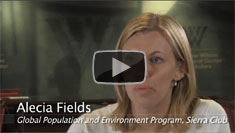
“The issues of population, health, and environment are pretty foreign to a lot of people,” said Alecia Fields, a recent University of Kentucky graduate who participated in a Sierra Club
Global Population and Environment Study Tour of Ethiopia last summer as a student fellow.
“I learned about the program, how to be an effective advocate, and I took those tools back to my university on campus and shared it with young people,” said Fields in this interview with ECSP.
Fields came from a women’s health background but found the connections between population, health, and environment (PHE) compelling enough that she wanted to become an advocate on campus. “At first, people don’t think they have a connection to the issue, but once you start talking with people, they really start to see how they are central to a larger issue,” said Fields.
“It is challenging in the United States to see some of the population and environmental issues…but when you go to a developing country, you see the effects right in front of you,” explained Fields. The Sierra Club’s Global Population and Environment Study Tours bring a select group of student advocates abroad to see PHE projects in the field with the aim of creating pro-active messengers of the importance of integrated development in the United States.
Fields visited various sites and organizations in Ethiopia including the Gauraghe People’s Self-help Development Organization (GPSDO), located in the southwest region. “People in Ethiopia have had tremendous success in connecting population, health, and environment within communities and starting integrated programs that work towards development,” said Fields.
Going to Ethiopia provided Fields with concrete examples of the importance of PHE and allowed her to share her experience with young people through meaningful illustrations and moving stories.
“A lot of it deals with figuring out where people are in their attachment to the subject…and try to figure out how that program can connect to them,” she said.
 “The issues of population, health, and environment are pretty foreign to a lot of people,” said Alecia Fields, a recent University of Kentucky graduate who participated in a Sierra Club Global Population and Environment Study Tour of Ethiopia last summer as a student fellow.
“The issues of population, health, and environment are pretty foreign to a lot of people,” said Alecia Fields, a recent University of Kentucky graduate who participated in a Sierra Club Global Population and Environment Study Tour of Ethiopia last summer as a student fellow. A Publication of the Stimson Center.
A Publication of the Stimson Center.








